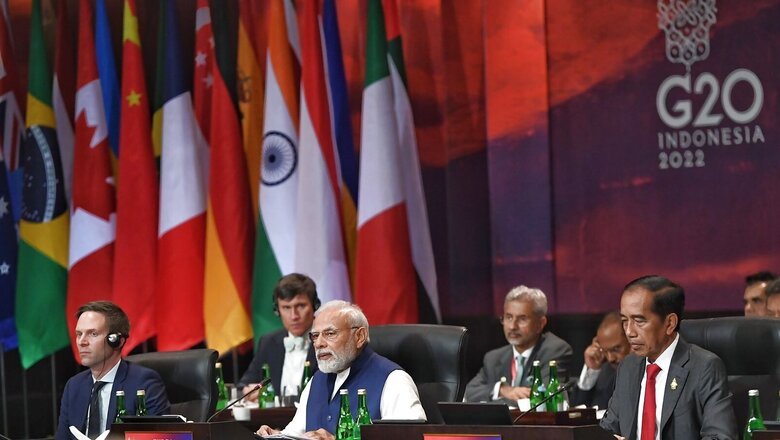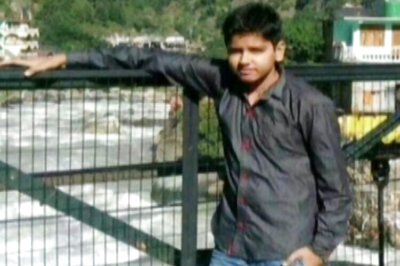
views
India will today take over as President of the influential grouping G20 from Indonesia.
Argentina, Australia, Brazil, Canada, China, France, Germany, India, Indonesia, Italy, Japan, the Republic of Korea, Mexico, Russia, Saudi Arabia, South Africa, Turkey, the United Kingdom, the United States of America, and the European Union are all members of the G20.
One Earth, One Family, One Future. #G20India pic.twitter.com/L63loRcuX6— PMO India (@PMOIndia) December 1, 2022
This comes at a time when the world order is facing an increasing threat of a global recession, which is looming large, as well as intensifying energy and food shortages, which are causing unprecedented inflationary pressure and making the cost of living unaffordable in both developed and developing nations, all while the Russia-Ukraine war continues unabated. India’s tenure as the chair of the G-20 comes at a time when these issues are all occurring simultaneously.
The rest of the world is looking to India to find solutions to all of these issues that are decisive while also being amicable.
A ‘China Challenge’ & Global South
Due to the fact that China aspires to become a global power, there is a great deal of uncertainty regarding the role that it will play in the existing global order and throughout the Indo-Pacific region, which includes the South China Sea and South Asia. This makes the task significantly more difficult, explains a report by IANS.
It is not just because of the resurgence of the Covid pandemic in China; it is also because of China’s reported ‘lack of sync with international laws and conventions, as well as its seemingly irreconcilable differences with Western countries on issues pertaining to the human rights of ethnic minorities and democratic movements in Hong Kong and Taiwan,’ the report states.
But with its reputation for nonviolence and cooperation, India shines as a guiding light in these troubled times. Because of its track record of finding solutions to geostrategic and bilateral issues through discussions, negotiations, and consensus within the bounds of international laws and conventions, its leadership of the G-20 raises hopes because it is equally acceptable to the advanced nations as well as the global South, which refers to the developing countries.
One Earth, One Family, One Future. #G20India pic.twitter.com/CePC28lzNE— narendramodi_in (@narendramodi_in) December 1, 2022
This is due to its history of finding solutions to geostrategic and bilateral issues. The other two most important reasons for India’s high level of credibility in the international arena are its adherence to an independent foreign policy and its adoption of peaceful and responsible means rather than force or military power to resolve differences. Both of these factors make India a very credible actor in the international arena.
Restoring Economic Order
There is a good chance that India will prioritise the synchronised response of the G-20 members in order to expedite the global economic recovery as soon as possible. Former Deputy National Security Advisor Pankaj Saran, who is now a member of the National Security Advisory Board (NSAB), stated in a recent interview that India’s number one priority during its upcoming presidency of the G20 should be to restore the economic order that provides stability and creates an environment that is conducive to the growth of an economy such as itself. Saran is now a member of the National Security Advisory Board (NSAB).
He added that another important priority for India during its Presidency would be to address the issues of concern to the developing world such as energy, food, and climate security, and to see how India’s voice and perspective can be infused into the G20. He said this would be accomplished by addressing the issues of concern to the developing world such as energy, food, and climate securities.
India is a microcosm of the world. #G20India pic.twitter.com/7iOK6bKwa6— PMO India (@PMOIndia) December 1, 2022
The current order of the world is fraught with conflicts and disagreements, which can even give rise to concerns about the possibility of an imminent third world and nuclear war. India’s participation in the establishment of a new global order that is characterised by peace, prosperity, and sustainable development has become an urgent necessity at this crucial juncture in the course of history, the report further stated.
Pankaj Saran highlighted the importance of restoring some semblance of sanity to the current order of the world, which he described as “witnessing the weaponization of economic and financial transactions in the world.” He stated that “the advanced economies of the western world and Russia are both to blame for this, and the developing nations like India are the ones who are suffering as a result.”
He added: “Having said that, India is in a unique position in the world because it has built up enough equities to talk to all sides, whether it be Russia, Ukraine, the United States, or Europe. This gives India a distinct advantage. As a result, we have the ability to play the role of President in bringing some sanity and rationality into the existing order of the world.”
Reform of Multilateral Institutions
In light of the fact that India is considered to be one of the most influential leaders of the global South, another issue that would be a top priority for India would be the reform of multilateral international organisations and institutions. In their current form, these organisations and institutions do not reflect the realities of the modern world. There is already a growing consensus among many developed and developing economies regarding the issue of providing emerging economies, such as India, with permanent seats in the United Nations Security Council and increasing their quotas in the International Monetary Fund to reflect their current political and economic roles and stature. One could follow this through to its logical conclusion.
Challenges
Nevertheless, India’s Presidency of the G-20 would need to acknowledge some of the challenges that do not have simple answers. Although developing countries and advanced nations face the threat of terrorism in equal measure, the concern on terrorism seems to have fallen off the global agenda, as observed in the G-20 in the Bali declaration, which got only a fleeting reference. This is despite the fact that developing countries and advanced nations face the same threat.
Although it would be challenging, bringing terrorism to the forefront of the G20 agenda is something that needs to be done nonetheless. Pankaj Saran said: “We face a dual challenge in the form of Afghanistan under the leadership of the Taliban and Pakistan’s repressive state. It remains to be seen whether or not we try to bring terrorism to the forefront of the G20 agenda, as well as the extent to which we do so, and this will be determined by developments on the ground.”
The greatest challenges the world faces today, can only be solved, by acting together. #G20India pic.twitter.com/IZfSTpS0xi— PMO India (@PMOIndia) December 1, 2022
It would be difficult for India, if it were to take on the role of G20 President, to maintain a state of equilibrium with China, a prominent member of the grouping, which has issues with advanced nations on the one hand and with India on the other. A challenge is presented by China’s aspirations to expedite its rise to global power and its expression of readiness to embrace even the military action to defend its interests. India is likely to ensure that G-20 deals and agreements bring a win-win situation to all the stakeholders; however, China’s aspirations present a challenge.
The former Deputy National Security Advisor issued a warning in an interview that dealing with China would be a “challenge” for India while it held the presidency of the G20. He predicted that New Delhi would take a “cautious approach” toward Beijing, judging it based on the actions it takes rather than the statements it makes. When it comes to areas in which the two countries and other members of the G-20 have disagreements, a deft hand with diplomacy and honest efforts from both sides would go a long way toward finding solutions.
Due Consideration, While Maintaining Its Core
It is not in keeping with India’s approach to impose its viewpoints on others without first gaining consensus that they should do so, and India is likely to give due consideration to the points of view of all the stakeholders if it holds the presidency of the G-20. In spite of this, India will, as is its customary practise, maintain a firm stance on issues pertaining to its core national interests. These issues include adhering to agreements on peace and tranquilly at the border, the conflict between Russia and Ukraine, as well as the purchase of oil from Russia. It is hoped that China will accept India and deal with India on terms that are equal while also serving as President of the G20. According to Saran, one can only hope that China comprehends and acknowledges the fact that India is not only a growing economy but also a growing power.
With inputs from IANS
Read all the Latest Explainers here




















Comments
0 comment